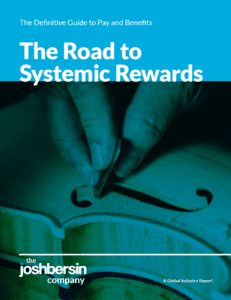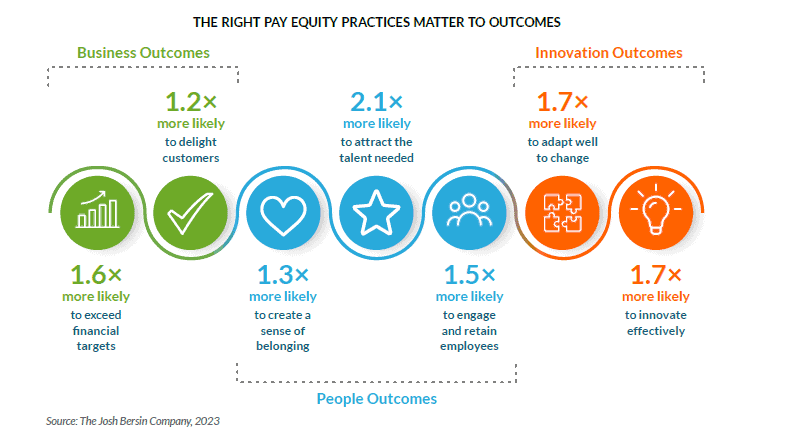Why Do Corporate Pay Practices Feel Broken? Because They Are.
New research by ADP and also by LinkedIn shows that pay has become the #1 factor in employee satisfaction. And no wonder: inflation is raging, people are overworked, and CEOs keep asking employees to be “more productive” (read “work harder”).
And how do companies keep up? They’re talking about laying people off, getting rid of jobs with AI, and forcing people to come back to the office. And in the middle of this, pay equity laws are getting passed and companies like Goldman are paying $200 Million settlements for unfair pay.
Somehow this just doesn’t make sense.
Well our new research on pay practices identified the problem: corporate pay practices simply have not kept up with the new world of work. Companies are facing a myriad of new challenges (rare skills which are hard to find, employees working in highly varied cost of living locations, inflation, and a continued war for talent). And what are we using to manage this? A set of old salary bands and job levels designed in the 1930’s and 1940’s.
 Yes, our newest research found out that many pay practices are decades old, and as companies try to adapt they’re creating all sorts of inequities, inefficiencies, and frustrations among workers.
Yes, our newest research found out that many pay practices are decades old, and as companies try to adapt they’re creating all sorts of inequities, inefficiencies, and frustrations among workers.
How do you think the IBM employees felt when the CEO stated that nearly a third of them can be replaced by Chatbots? How do you think Facebook or Google employees feel when the CEO makes a veiled threat about “the year of efficiency.” (I guess prior years were “the years of squandering money.”)
How do Salesforce or Morgan Stanley employees feel when the “CEO who says we’re a family” suddenly says “well, maybe we’re not quite a family because I have to let a bunch of you go. And by the way, we probably shouldn’t have hired you in the first place.”
And this problem is getting more urgent. We just finished meeting with Cisco, one of the most esteemed tech companies in the world. When asked “what element of your wellbeing are you focused on?” employees answered that “financial wellness” is by far their #1 priority (70%). And despite Cisco’s competitive wages, 27% have a high debt to income ratio and 44% have a “high degree of financial stress.” Companies need to deal with this.
(This week the BLS reported that unemployment dropped again and wages increased by an annual 4.4% rate, further raising the need to pay adjustments.)
Well pay practices have to adapt. As our research discovered, only 9% of companies are truly excellent at delivering fair, equitable, performance-based pay. And that means that 91% of our organizations can do a lot better.
What are some of the problems we found?
First, employers have over-rotated towards benefits. US companies now spend around 32% of payroll on vacation, insurance, perks, wellbeing, and other non-cash benefits. We’ve been piling these on like crazy over the last ten years and why? A lot of this increase has been an escalating war for people. It’s not paying off. (The research shows that over-spending on benefits has only a modest impact.)
Why do employees decide to come to work for your company? It’s not that complicated. They want a job they like, they want to learn and grow, they want to feel part of a mission they relate to, and they want fair pay and equitable treatment as a worker. Add these things up, and include a dose of good management, and there’s no reason to provide pet benefits or expensive perks to keep people happy.
I’d suggest that much of this 32% (it’s billions of dollars) is never really used (we had more than 90 benefits programs at Deloitte and nobody knew what they all were) and at least a small amount of this would be much better spent on great training, career development, and tools to make work easier.
On the topic of pay equity, our somewhat out of date pay practices have created wide inequities everywhere. Young, highly skilled engineers often make 25% or more than seasoned engineers, simply because they’re in high demand. How do you think that makes existing employees feel?
And then there’s the issue of performance-based pay. New research shows that almost 70% of employees think the performance management process is a “waste of time,” so how do you think people feel about getting a small raise based on performance? We distribute merit pay increases like peanut butter and high performers feel under-recognized while mid-level performers also feel underwhelmed.
(Best practice companies like Capital One and SAP distribute raises uniformly across all employees at a given level. Then they uses bonuses to reflect performance, preventing the problem of institutionalized pay inequity driven by performance management.)
 |
There are dozens of things we discovered that really need some attention. What else did we find? These 9% of companies who are ahead of the curve are far outperforming their peers (their Glassdoor ratings are almost 15% above average, for example). They pay people fairly, the adjust pay frequently, they communicate pay policies clearly, and they don’t pay out merit increases (they use cost of living and competitive wage adjustments) so they can pay bigger bonuses.
And on the topic of pay equity: our research discovered that pay equity is 13-times more important to employees than “level of pay.” Yes, I’m not kidding. So we have to design the whole system around equity: clearly defining what performance means, explaining to people why they are or are not performing at a given level, and removing all forms of bias that keep women behind men in levels of pay.
 |
The EU has now made pay equity analysis a mandatory process starting in 2024 and most states in the US are now mandating pay transparency in job postings. This means employees are very aware of the pay disparities in your company, so pay equity has to be a new business practice as well.
Join us on this journey to build what we call “Systemic Pay and Rewards.” Kathi Enderes, our SVP and author of this research, is presenting a series of webinars and workshops on this new research. I think it’s one of the most important projects we’ve ever done.
You can download the overview of the research now, but I’d suggest you join our Corporate Membership to get the details. Paying people fairly and understanding how to build a trusted, effective reward system is one of the most important things you can do. We are here to help.
Additional Information
New Regulations Will Force Companies To Address Pay Equity
The Changing Face Of Total Rewards (A Certificate Program In The Josh Bersin Academy)
